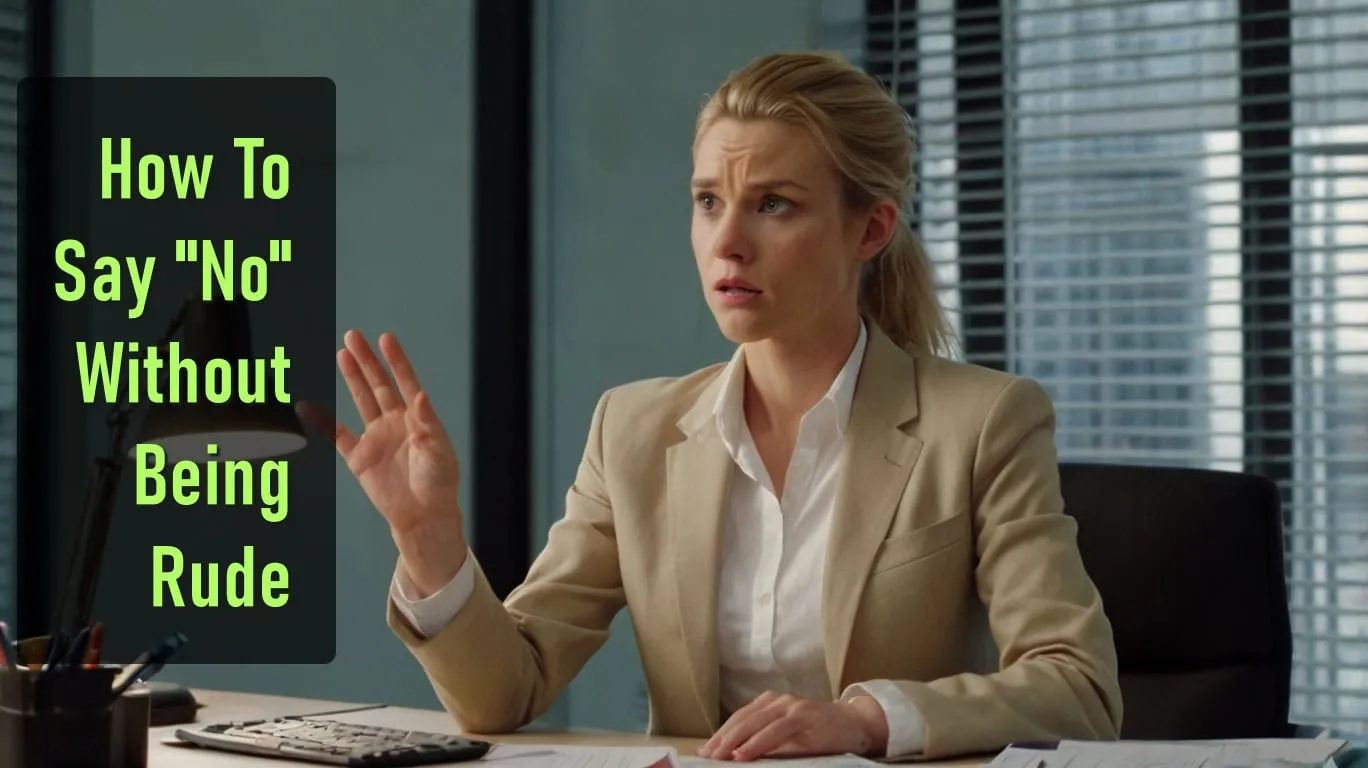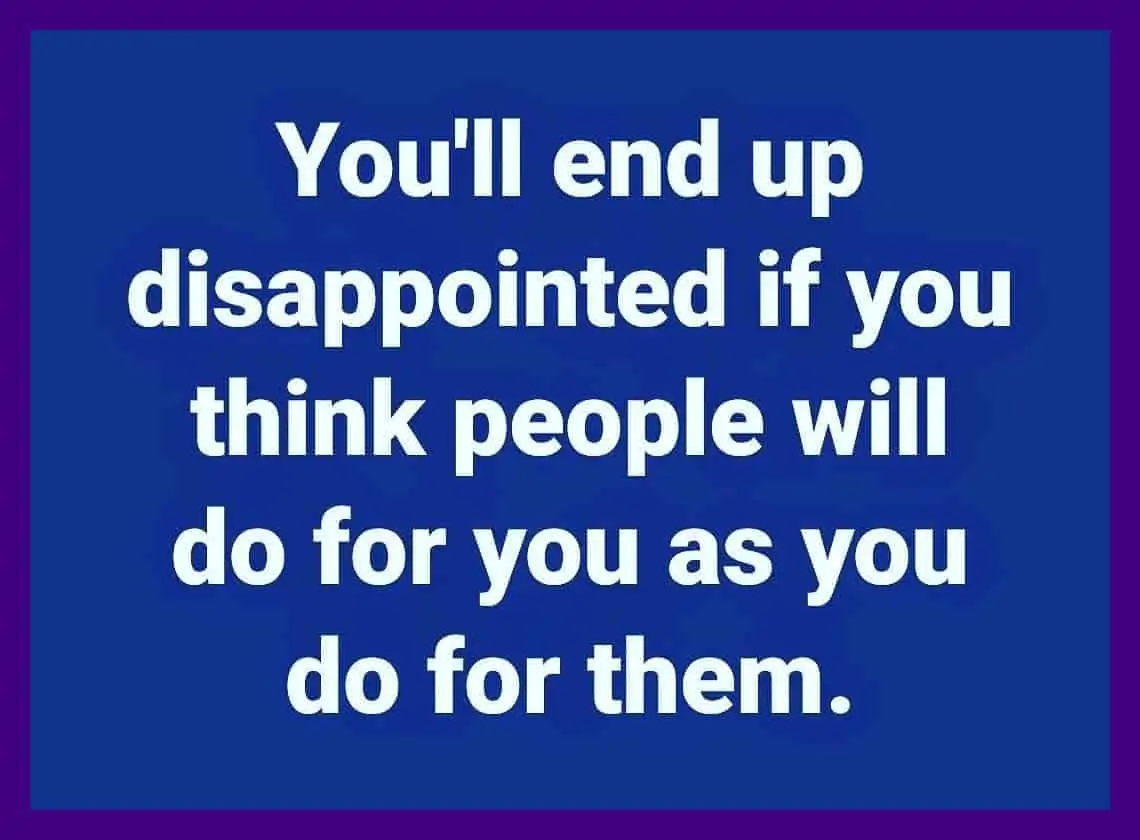Today's Saturday • 18 mins read
— By Dr. Sandip Roy.
“Half of the troubles of this life can be traced to saying yes too quickly and not saying no soon enough.”
— Josh Billings, English navigator, and explorer
Do you have trouble saying No to people?
You sacrifice your time and energy for them. And then grumble when alone for ignoring your work and yourself.
Actually, you trained them to push you into doing things. They know whose door to knock on when they have a problem, “Ask him, he never says no!”
What a self-punishing way to be a nice person, right?
Be good, not nice.
- Being good means you value your time, energy, and peace.
- Being nice means you are a people-pleaser.
Vow to stop pleasing people. You can say No whenever. And you don’t owe an explanation for saying “No” to anyone.

9 Ways To Say “NO” Without Lying, Hurting, Or Being Rude
Dancing to the beat of someone else’s drum saps your energy, resources, productivity, and time. Stop that today.
Learn these 9 foolproof ways to decline gently, without being rude or hurting anyone’s feelings:
1. Suggest a later time.
This is the best way to say No to a pushy person. It will let you focus on your work in peace, and give you the time to think up a more forceful way to refuse their offer.
Every so often, you feel cornered and find it hard to sneak away from someone’s proposals or requests. When in one such tight situation, offer them your best option:
No, thank you, but it sounds lovely, so next time.
You can ask them to postpone the plan while offering to make it some other time. This will finally bring both of you to an agreement, and it will be you saying a halfway No.
No, please. Check with me some other time.
If there’s one quick practical tip to kick-start your habit of declining, it’s this: Postpone saying Yes or No right away. Instead, say you need some time to decide.
That’s positive procrastination – strategically delaying tasks to a specific time later while focusing on your more urgent tasks.
Unfortunately, now is not a good time. Not today. Not this week.
Don’t ask their permission if you can get back to them sometime later.
Make it plain and clear that you will inform them when you have thought it over.
I need time. I’ll let you know after I find time and think it over.
2. Just Say No in a normal voice.
Each time you feel pressure to give in to someone, a highly effective way is to say a gentle “No” and then fall silent.
Blurt it out – say No in a normal voice and smile. Then turn back to work.
“No” is an entire sentence and does not require another word to complete it.
Saying No doesn’t need you to raise your voice to a level of irritation, rudeness, or meanness. In fact, you should always say No politely, even when it’s that pushy person.
Being polite doesn’t mean you have to agree with everything they say. It just means you’re not going to let them bully you into doing something you would rather not do.
“In human communication, politeness is very important. It is a key point in enhancing the interpersonal relationship and communication.”
— Reconstructing the Politeness Principle
When someone asks you to change your well-set plans for them, refuse while being your polite self, offering no explanations. Simply say a courteous No and walk away.
No.
Do not wait for a later time; say No immediately.
The more time you take, the more chance they get to add to the pressure by dropping hints or explaining how it would benefit you.
Tell them straight away you won’t be able to accommodate them.
No.
Let them know you would have loved to do what they ask for, but some important commitments are coming your way.
The thing is to speak what you really feel like speaking out, right away, with civility and propriety.
No.
Your gentle honesty might disarm them, or not, but you will have saved your plans while keeping your head cool.
Never hesitate to say “No” to a bad date.
3. Become more assertive overall.
The more you say “Yes” to every offer and every person, the more people size you up as a pliable and bendable person.
They see you as someone made of clay-for-play.
However, once you become assertive and start saying No more often, people see you as someone who is not easily influenced.
I’m not taking anything else right now.
When people realize you can straightforwardly say “No” exactly as you mean it, they hesitate to push their agenda on you.
By putting your needs first, you also cut your chances of meeting those pesky “influencers” who can even persuade you to donate the pants you’re wearing to their charity.
I appreciate the offer, but no. Thank you.
Always remember, you can be kind while asserting yourself. With your considerate nature, you can make them see your firmness of decision, while also not going away feeling hurt.
No. Thank you.

4. Recognize when to ‘not’ say No
Occasionally, your denial is fraught with mortal danger. You cannot say this type of “No.”
Who is the person who is asking your favor—a cop, a boss, your wife, or a simpleton with a big knife in his hands?
You need to analyze the possibilities precisely for what might happen if you refuse.
Weigh those risky situations up to make sure you can absolutely get away with a No.
I never say No to you. But this is only for you.
If it can have some far-reaching consequences when you say No, you are better off saying Yes.
For instance, you would not like to provoke an irate boss or a baleful spouse unless you are fully prepared to handle the repercussions.
People like them cannot take No for an answer and make brisk plans to retaliate.
How can I say No to you? I have to live!
Think about the ramifications of your No. Analyze if your denial will lead to something disastrous. It will help you make the right decision in the right situation.
It might save you and your prospects from getting hurt.
Let go of your urge to say No. Stop yourself from hurting that person’s feelings who’s making you the offer. Save your skin.
You’re making an offer I can’t refuse!
Narcissists can fly into an uncontrollable rage when replied with No.

5. Tell them your reason for refusing
For once, just sit back and think how a simple No could improve your life.
Suppose you were ready to go out with your daughter when your boss calls you and asks to check a corporate assignment.
Now, instead of taking it up and blowing your plan, you could say No by telling him your reasons.
The idea is to keep your reasons ready and preloaded.
I’m booked into something else right now.
Focus more on the little things in your life that give you joy. And let go of some bigger things you get pushed into.
I’ve to go out with my daughter.
Later in life, you would realize how important those little joyful things were.
Then you might regret why you did not pick them over the tasks others asked of you.
Keeping this in your mind will keep you sharp in refusing with politeness, even when it is tough to do so.
I’ve to watch a movie with my family.
You meet people who are pushy enough to force their ideas on you. They trap you and make you feel obligated to agree to their offer.
Stop yourself from getting carried away in such situations. Instead, stay sharp and explain in a calm voice why you cannot take up their offer.
Now, your reason could be of any kind — good, bad, or lame.
I’ve to feed my goldfish and watch them swim around.
Finally, know and remind yourself that “I don’t want to” is a valid enough reason to decline with politeness, and you can say it out loud and clear when asked why.
6. Stop feeling guilty before saying No
Occasionally, a No to the face could make you feel guilty.
At those times, assure yourself it is alright to feel so, to save yourself from compromising your plans.
You have your priorities to sort out, and they come first before you can agree to the plans others have for you.
Tell yourself in such situations:
It’s okay to feel a little guilty to save my bigger plans.
But if you were to go their way and sabotage your well-set plans, you would feel guilty even then. And this time in a big, bad way.
This time, you might even set yourself up for retaliation against the person who made you do things you did not want to.
This feeling of bottled-up guilt can drive you to hurt the person’s feelings at the first chance you get.
It’s okay to say No and feel a little guilt, rather than do it and repent.
The guilt of a No evaporates as you revel in the positive payoffs of your choice. When you feel the guilt of saying No, ask yourself:
What am I saying No for?
Once you answer that to yourself, you would no longer feel guilty to say No. You will realize that your polite refusal has made room for priorities in your life.
Now, you will have more time to do things that give your life meaning. You will have more energy to spend on your family and your close ones.
Finally, saying “Yes” to their every wish and command does not obligate them to return you the favor.
They are free to decide what they want to do when the time comes, as you are now. More often than not, you will end up disappointed if you think people will do for you as you do for them.
I’ll end up being upset if I expect people to do for me as I do for them.

7. Tell them you are not the last resort
Realize this: you matter little to them. Your withdrawal from their plans would not affect either of you too much. Once you realize that, it will be easier for you to say No.
Tell them respectfully you cannot be their last-resort person every time they have a problem.
Maintain eye contact and stay firm in your voice, while remaining polite all throughout. This will help them understand that you cannot be at their beck and call for each of their errands.
A courteous, not curt, No can make both of you not feel hurt about it.
I have certain boundaries that are inviolable. So, no. And thank you.
So, do not put yourself in a situation where you have to say Yes when the person inside you is silently shrieking out No.
When you agree to an inconvenient proposal, it might tax you with resentment and anger, and eventually, may burn you out. A simple No saves you all that.
I’m not your guy. Thank you.
8. Remind yourself you cannot please everyone
You simply cannot please everyone. That is one truth you need to accept fast.
Trying to please all, you take on unnecessary stresses on yourself.
You also ruin your happiness eventually.
I would rather not take up your offer. Thank you anyway.
People-pleasing is never a healthy habit. The people-pleasers remain addicted to others’ approval and are low on self-esteem.
Your being overly nice to others may allow them to take advantage of your eagerness to please them (like narcissists do to people who are high on empathy).
Also, your nice nature makes you a dispute-avoidant person. Such people are afraid of being disliked and have a strong aversion to negative emotions.
They often suffer from a feeling they have not done enough for others.
Acknowledge that no matter how hard you try, you cannot make everyone around you happy.
Fault-finders and trolls are everywhere. Even your best intentions and utmost efforts cannot make everyone pleased. You must accept that.
I’m honored, but I can’t.
Keep telling yourself:
“Trying to please everyone will ultimately exhaust me. Some people will always stay unhappy, no matter what I do for them. So, I can stop trying to please them all. I’d rather say No.”
Look at it this way: The people-pleasers typically get seen as manipulators who put up their acts to collect approvals and later favors.
So, stop feeling afraid because you think they might refuse you when your time comes to ask them for a favor.
When you feel insecure this way, you go on doing every little thing they ask you to keep them pleased. This behavior badly affects your self-esteem.
I’d love to help you, but I cannot.
A research-based book on the people-pleasing problem is The Disease To Please by Harriet Braiker.
People-pleasers become deeply attached to seeing themselves—and to being certain that others see them—as nice people. Their very identity derives from this image of niceness.And, while they may believe that being nice protects them from unpleasant situations with friends and family, in actuality, the price they pay is far too high. — Harriet B. Braiker, psychotherapist
9. Make sure your self-worth does not go down with their rebuff
Do you recognize your true worth? A good way to find out is if you say Yes to any proposal or behest that comes your way.
Of course, most of those you rebuff will retaliate on the go. They will tell you demeaning things and at least make disdainful expressions to make you feel down. But if you are firm in your self-worth, you know your value cannot get harmed by their words.
So, find out what you are to yourself. Fix your self-worth first. It would improve your confidence remarkably.
As your confidence grows, you figure out the downsides of agreeing to everything thrown your way. This further strengthens your resolve to say No. And you gradually find it easier to refuse the more persuasive people with gentleness.
I can decline to pick up any trash thrown my way.
In the end, you will have added chunks of quality time to your life.

4 Quick Tips To Say No When Someone Is Pushing You Around
1. Be Clear About Why You Are Saying No.
If you’re saying no because you want to avoid hurting someone’s feelings, then make sure you explain why.
Don’t just bluntly say, “I’m sorry, I can’t.”
Instead, try something like, “It’s really hard for me to say ‘no’ to you right now, but I need to focus on my own priorities at the moment.”
2. Don’t Take Anything Personally.
Saying no isn’t easy, especially if you care about what other people think.
But if you don’t stand up for yourself, others will take advantage of you.
So, if someone tries to pressure you into doing something, tell them “No” firmly and politely. Then, walk away.
3. Avoid Arguing or Fighting.
If you’re having trouble saying no, try to avoid arguing with the person who’s pressuring you.
Instead, explain why you need to decline their request. This shows that you respect yourself enough to make decisions for yourself.
4. Give Yourself Time to Think Things Over.
Don’t let anyone pressure you into doing anything you aren’t comfortable with.
Take some time to think things through before making any decision.
Why Is It Difficult To Say No?
Two problems make it difficult to say No:
- The first is this: Until you say it, an unsaid No hangs like a burden heavy on your head. A simple “No, thank you” takes that load of indecision off your mind and settles you back into the valley of calmness.
- The second is this: When you say No, they know you set a boundary in that relationship. They will have to respect that boundary from then on. It’s this that makes them feel challenged and uncomfortable. So, they react and charge at you to make you feel bad.
The thought of saying No to someone asking for your favor may cause you anxiety. But once said, a firm No gets you back into the driving seat.
Soon after you blurt it out, the anxious feelings turn into relief.
You must stand your ground and stick to your No. It may seem hard at first.
The good thing is, the more you do it, the easier it gets. More so, once you accept it’s not at all your fault if they get irked or feel offended at your No — it’s their decision.
You are not responsible for the emotions of others.
Those who usually get a quick “Yes” may take time to adapt to your ”No.“
If they don’t change their nature, then you would do right to let them go. After all, the constant bitterness isn’t worth your mental peace.
When you have a valid reason to say No, they shouldn’t make you feel bad or guilty about it. If they do, then you should confront them about why they make you feel bad for saying No. An honest and compassionate conversation can work things out most of the time.
But if they offer a weird excuse for doing what they do, it’s obvious they don’t want it sorted out. It also becomes clear that the person doesn’t respect your space, needs, or boundaries. Why would you bend over your back to indulge such people?
To be honest, you never owe anyone an explanation for saying “No.”
Realize once and for all that you are allowed to say No for the sake of saying No.
“No” is a complete sentence that doesn’t beg any excuse or explanation.
It’s perfectly all right to say No, whatever the reason. You never need to feel ashamed about it.
It may be hard at first. In time, it will get easier as they start accepting that your “No” means “No.”
Why Can’t You Say No: Fear or Guilt?
You find it hard to say No because you are afraid you would sound rude to the other person and make them feel hurt.
Moreover, if you were to say No, you fear you would feel guilty. See that double-edged dilemma?
You realize you ought to speak No to save yourself from painful demands on your time and energy. Still, you cannot bring yourself to do it as often as you would like it.
Suppose you are planning to plug into your hobby project or spend some alone time all by yourself when your friend rings you up to come over.
Now, as you cannot say No to them straight to the face, you let your little plan get ruined.
So, for the fear that you might hurt him by saying No, you end up hurting yourself by saying Yes.
Dancing to someone else’s tune costs you your energy and time. That is something you need to save yourself from. To do that, you must learn to say No when you want to say No, without jettisoning your social etiquette.
I am free to say No when I want to say No.
Final Words
- Make a note of all the things that come first in your life.
- Then stop feeling guilty as you reject everything that isn’t your priority.
- Shake off your inhibitions and start saying No—with firmness but calmness.
The more you do it, the better you get at using that word. It is like a self-fulfilling prophecy.
Don’t make space for the inconvenient demands of others. It does a disservice to you and your loved ones, as they have to give up their rightful demands on your time and energy.
Finally, celebrate the successes of the little polite refusals you will make in the coming weeks. This will keep you motivated to refuse the unhealthy demands on your time.
Try to read the book: Boundaries: When to Say Yes, How to Say No to Take Control of Your Life by psychologists and leadership experts Henry Cloud and John Townsend.
Egos can make gentle criticism feel like acid assaults.
• • •
Authors: Shirley Brown, an experienced lifestyle orator and academic expert, wrote a short, early version of it. Extensively rewritten, expanded, researched, and edited by Sandip Roy.
√ Also Read: How To Be NOT Sensitive To Criticism (7 Rules For Life)
√ Please spread the word if you found this helpful.
• Our Story!
» You deserve happiness! Choosing therapy could be your best decision.
...
• Disclosure: Buying via our links earns us a small commission.